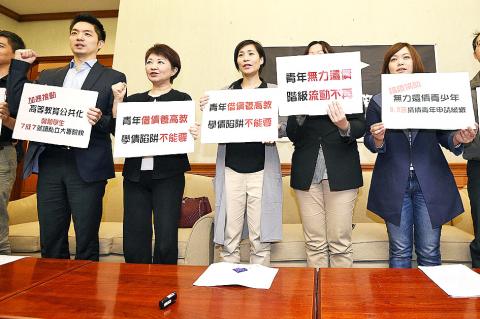Tighter regulation and moves toward nationalization — not tuition hikes — are the answers to falling student numbers pushing many universities toward the fiscal brink, activists said yesterday, adding that tuition hikes would only further disadvantage poorer students, who are already often forced to pay more for less.
“Disadvantaged students are being forced to pay more for inferior education because of our failure to establish a system to weed out universities,” said Taiwan Alliance for the Advancement of Youth Rights and Welfare secretary-general Yeh Da-hua (葉大華), flanked by several national legislators from across the political spectrum.
Yeh condemned the Ministry of Education’s plans to address the fiscal crisis by allowing private schools to increase tuition fees while extending the time frame for students to pay off loans, saying that disadvantaged students at private schools are already charged several times the tuition fee of better-off students who are able to gain entrance into the nation’s relatively elite public universities.

Photo: Chen Chih-chu, Taipei Times
“The commercialization of education and unequal distribution of resources have created a situation where education actually drags down social mobility rather than helping students escape poverty,” she said.
She added that students attending private schools often incur substantial debts for an inferior education.
“The ministry should take more proactive measures than just allowing the rescheduling of debts, because the real issue is how much debt students are forced to incur,” Yeh said, attributing the poor quality and high cost of private institutions to lax regulation, which she said allowed schools to fabricate costs to get around fee restrictions.
While the ministry caps tuition and fees, some schools use loopholes to hit students with additional charges, she said, calling for the ministry to establish a rigorous review system.
National Association for the Promotion of Community Colleges director Hsieh Kuo-ching (謝國清) said that private high schools should also be subject to higher quality standards because of the government subsidies they have received following the elimination of high-school tuition fees.
“If you are going to subsidize, you also have to manage, including costs and quality,” he said, adding that the government should implement quality control measures similar to those in place for private kindergartens, which also receive extensive government subsidies.
Chan Cheng-tao (詹政道), the director of the National Federation of Teachers Unions’ social development department, said that moves toward nationalization should also include a requirement for private schools’ governing boards to include public welfare and labor representatives to allow greater civic participation in the determination of school fees.

Nipah virus infection is to be officially listed as a category 5 notifiable infectious disease in Taiwan in March, while clinical treatment guidelines are being formulated, the Centers for Disease Control (CDC) said yesterday. With Nipah infections being reported in other countries and considering its relatively high fatality rate, the centers on Jan. 16 announced that it would be listed as a notifiable infectious disease to bolster the nation’s systematic early warning system and increase public awareness, the CDC said. Bangladesh reported four fatal cases last year in separate districts, with three linked to raw date palm sap consumption, CDC Epidemic Intelligence

The manufacture of the remaining 28 M1A2T Abrams tanks Taiwan purchased from the US has recently been completed, and they are expected to be delivered within the next one to two months, a source said yesterday. The Ministry of National Defense is arranging cargo ships to transport the tanks to Taiwan as soon as possible, said the source, who is familiar with the matter. The estimated arrival time ranges from late this month to early next month, the source said. The 28 Abrams tanks make up the third and final batch of a total of 108 tanks, valued at about NT$40.5 billion

Two Taiwanese prosecutors were questioned by Chinese security personnel at their hotel during a trip to China’s Henan Province this month, the Mainland Affairs Council (MAC) said yesterday. The officers had personal information on the prosecutors, including “when they were assigned to their posts, their work locations and job titles,” MAC Deputy Minister and spokesman Liang Wen-chieh (梁文傑) said. On top of asking about their agencies and positions, the officers also questioned the prosecutors about the Cross-Strait Joint Crime-Fighting and Judicial Mutual Assistance Agreement, a pact that serves as the framework for Taiwan-China cooperation on combating crime and providing judicial assistance, Liang

A group from the Taiwanese Designers in Australia association yesterday represented Taiwan at the Midsumma Pride March in Melbourne. The march, held in the St. Kilda suburb, is the city’s largest LGBTQIA+ parade and the flagship event of the annual Midsumma Festival. It attracted more than 45,000 spectators who supported the 400 groups and 10,000 marchers that participated this year, the association said. Taiwanese Designers said they organized a team to march for Taiwan this year, joining politicians, government agencies, professionals and community organizations in showing support for LGBTQIA+ people and diverse communities. As the first country in Asia to legalize same-sex